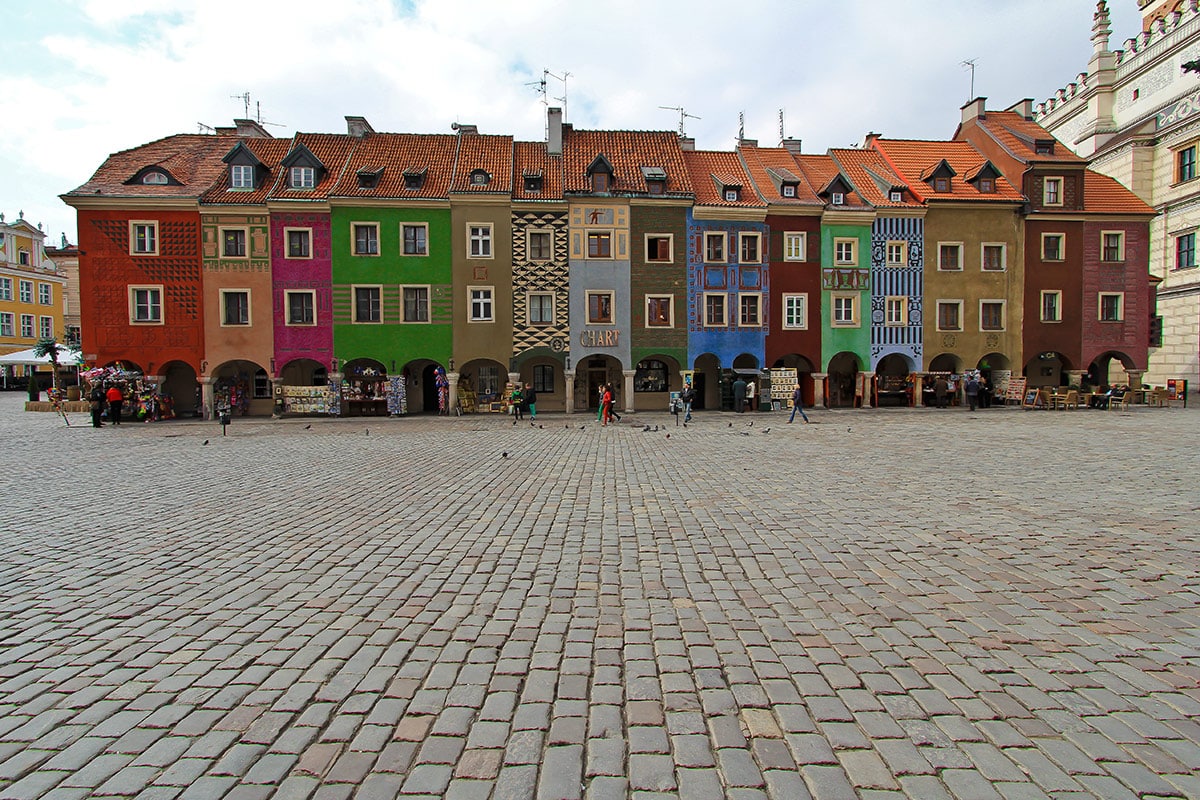Wondermondo 🢖 World 🢖 Wonders of Europe 🢖 Wonders of Poland
Territory
Wonders of Poland
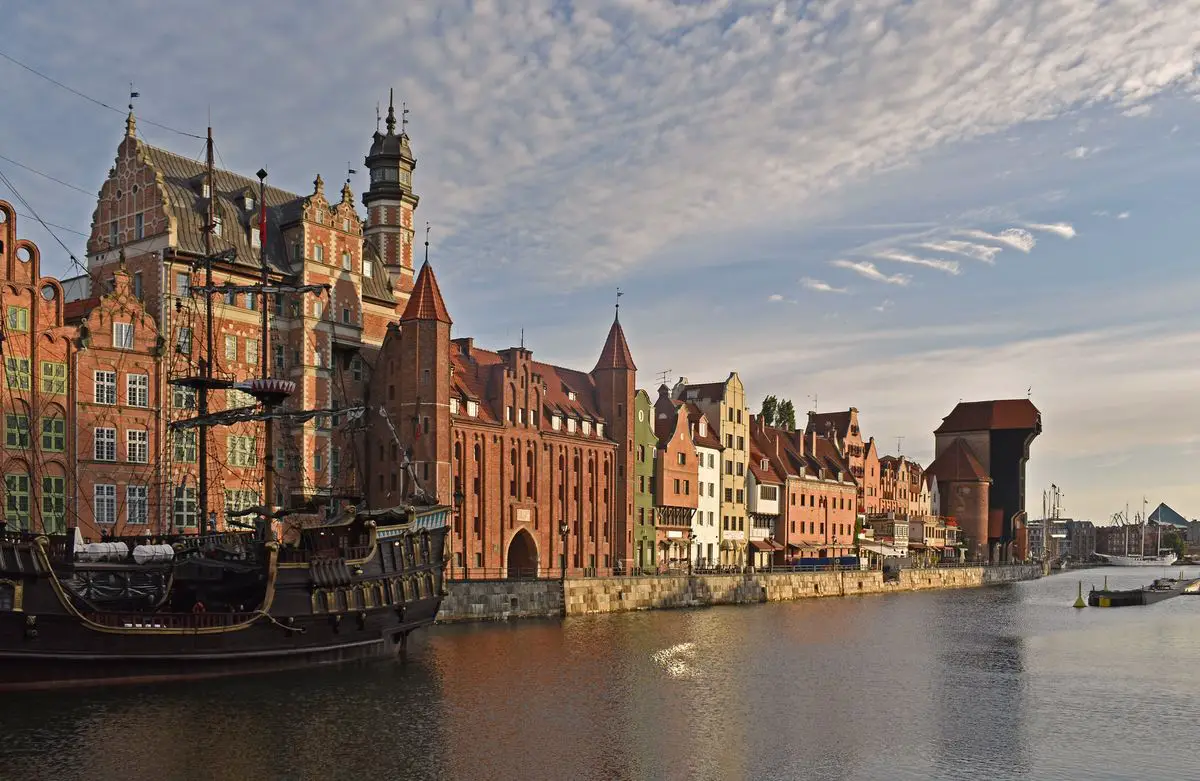
 Highlights
Highlights
Wast majority of wonders of Poland are its outstanding architecture monuments. In spite of terrible wars Poles have persisted and Poland together with its heritage has reborn as a phoenix rising from the ashes. Most guests would be amazed to learn how many beautiful historical buildings are exact replicas, that were rebuilt in times when life in Poland was not that easy.
The most amazing wonders of Poland are:
- Gothic architecture from brick. The largest castle in the world is located in Poland (Malbork Castle), as well as the third-largest brick church in the world (Gdańsk St. Mary’s Church). Unique is the medieval center of Toruń with a unique collection of such brick buildings.
- Renaissance architecture. Poland was a major European center of Renaissance art and such amazing landmarks as Zamość and Kazimierz Dolny towns, Krasicki Palace and Poznań Town Hall belong to the best examples of this architectural style.
- Medieval wooden churches. Numerous very old wooden churches are found throughout the country. The oldest ones – such as the unique Haczów Church (1388) – belong to Gothic style.
Map with the described wonders
If you see this after your page is loaded completely, leafletJS files are missing.
 Top 25 wonders of Poland
Top 25 wonders of Poland
Architecture wonders
Wieliczka Salt Mine
Lesser Poland
Some of the oldest operating salt mines in world, operates since the 13th century AD. Up to 327 m deep, more than 300 km long. Miners have carved multiple reliefs, chandelier, cathedral.
Książ Castle
Lower Silesia
Massive, well reconstructed medieval castle, built in 1288 – 1292, the largest castle in Silesia. 900 m long network of underground passages in two levels, built by Nazi as secret military facilities and possible headquarters of Hitler.
Malbork Castle
Pomerania
The largest castle in the world by the area (21 ha), also the largest brick building in Europe. Constructed by Teutonic Knights, mainly in 1274 – 1300 as their administrative center.
Kraków Historic Centre
Lesser Poland
This ancient settlement evolved into a significant city since the 10th century AD and in the 11th century became the capital of Poland. Kraków flourished in the 15th and 16th centuries when many works of Polish Renaissance were created here. Served as a major center of power, art, and science. Today it is one of the most spectacular and interesting medieval cities in Europe. Contains the largest medieval market square in Europe, surrounded by exquisite historical buildings. The Center contains some 6000 valuable buildings, millions of artworks.
Zamość
Lublin
Renaissance town, founded in 1580 and built as an ideal town that has preserved its original planning and architecture up to this day. Surrounded by an enormous fortress.
Wawel Cathedral
Lesser Poland
Large, complex Gothic cathedral, built in the 14th century. Serves as a Polish national sanctuary, historical place where took place coronation of Polish monarchs. Notable achievement of Renaissance art is Sigismund’s Chapel.
St. Mary’s Basilica in Kraków
Lesser Poland
An enormous church building that was constructed in the 14th century in brick Gothic style. Contains the largest Gothic altarpiece in the world. Two towers, the tallest is 80 m high.
Wilanów Palace
Masovia
An enormous, ornate palace, constructed in 1677 – 1696 in Baroque style. Served as royal palace, has very ornate interior and Baroque garden.
Collegium Maius
Lesser Poland
One of the oldest dedicated university buildings in Europe, constructed in 1364 in Gothic style. Well preserved and ornate historical lecture rooms, professor’s quarters, library and other premises.
Toruń medieval town
Kuyavia-Pomerania
Inhabited since 1100 BC, modern city developed around the castle since the early 13th century. Well preserved medieval town with hundreds of historical buildings, including numerous Gothic buildings from brick. The largest concentration of Gothic architecture in Poland.
Wawel Castle
Lesser Poland
An enormous royal castle, built since the 14th century in Gothic and Renaissance styles. Contains collection of valuable royal regalia and treasure. Castle served as a model to some other royal castles in this part of Europe.
Jasna Góra Monastery
Silesia
Major site of pilgrimage: large monastery that was founded in 1382 and housed in ornate, impressive buildings. Here is located Black Madonna of Częstochowa – an image that has miraculous powers attributed to it.
Niedzica Castle
Lesser Poland
This magnificent castle rises tall above the river. Constructed in 1320 – 1326 in the place of prehistoric stronghold. Site of legends.
Abbatia Lubensis (Lubiąż Abbey)
Lower Silesia
The largest Cistercian monastery in the world with 223 meters long Baroque facade, developed since 1150. One of the largest and most ornate Christian religious buildings in the world.
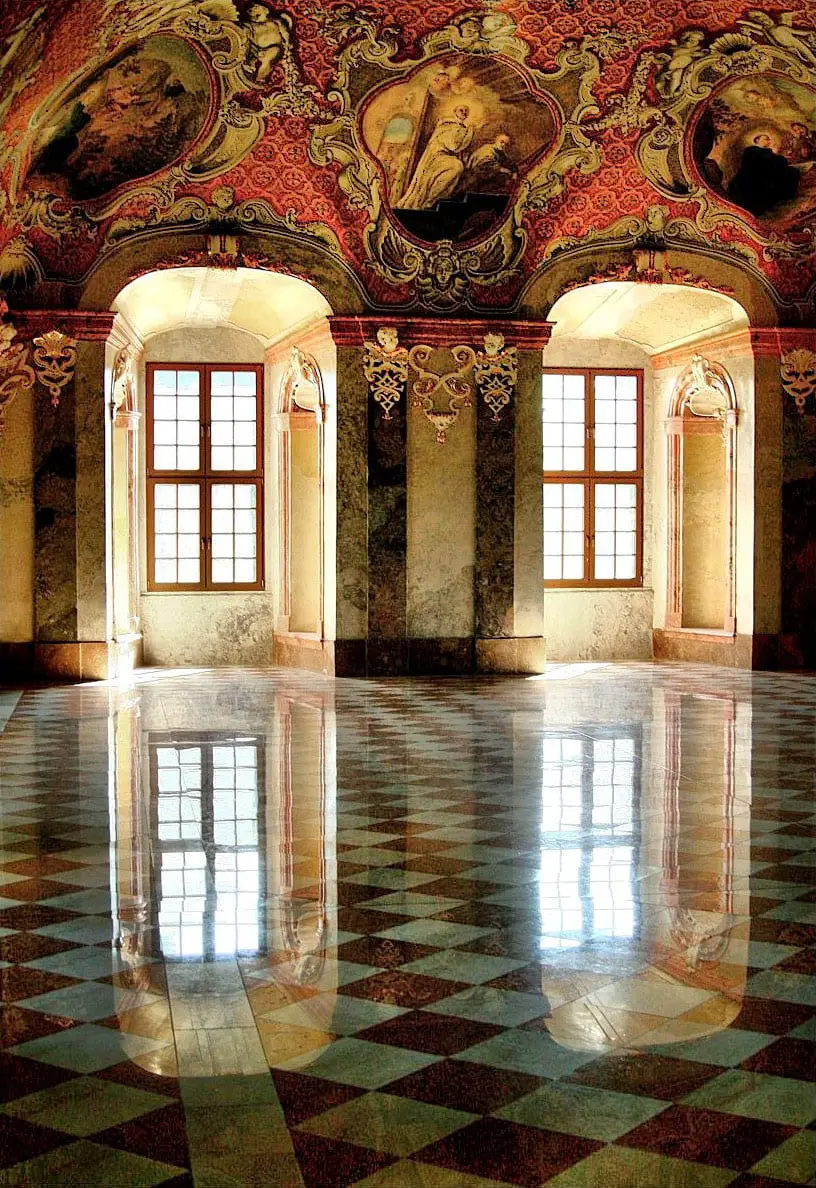
Krasicki Palace
Podkarpackie
Large, ornate castle in Renaissance style, built in 1580 – 1633. This magnificent building has been preserved without major changes.
Gdańsk St. Mary’s Church
Pomerania
Third largest brick church in the world, an enormous Gothic structure built in 1379 – 1502. 25,000 people can fit inside the church. Very impressive, intricate vault system.
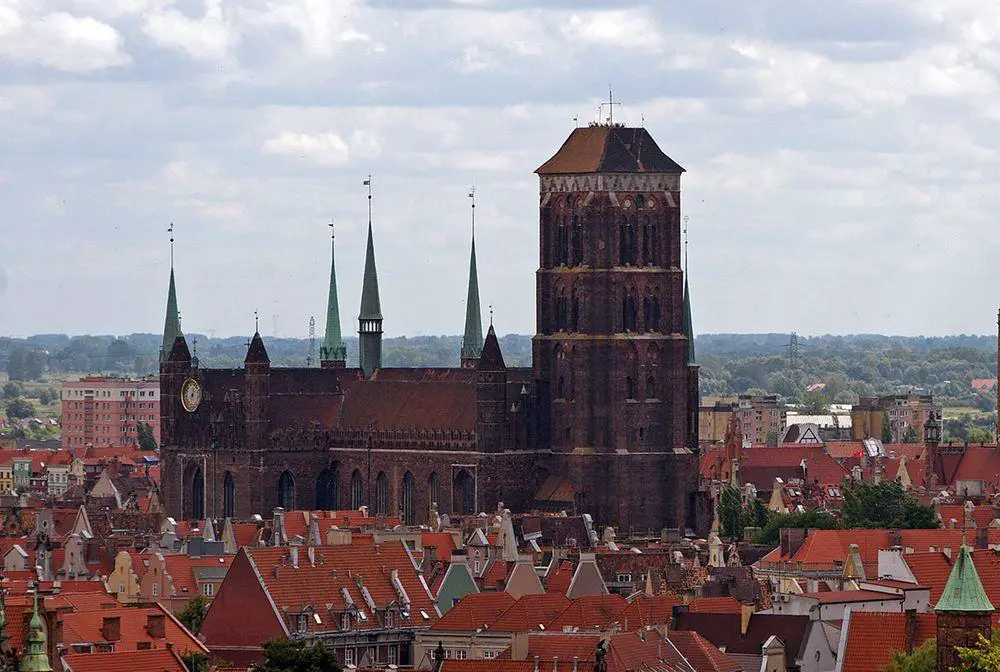
Church of Peace in Świdnica
Lower Silesia
The largest timber-framed church in Europe, constructed in 1657. 7,500 people can fit inside. Great interior with frescoes.
University of Wrocław, Main Building
Lower Silesia
Old university, established in 1702. The enormous main building contains rooms with opulent interiors, including the Baroque interior of Aula Leopoldina and the University Church.
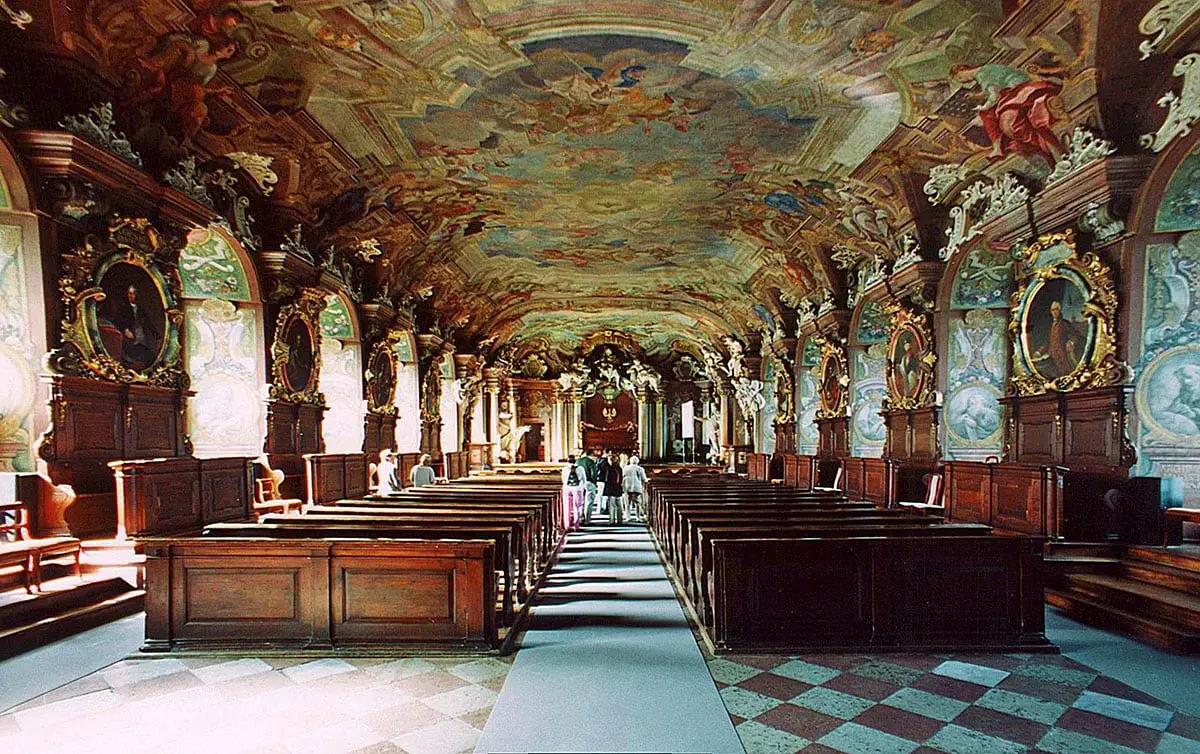
Kłodzko historical center
Lower Silesia
A well preserved historical center of a medieval (mainly – Renaissance) city with many valuable buildings. A huge network of underground tunnels under the city that were built by merchants. Many passages collapsed in the middle of the 20th century, causing much damage to the city. Bridge in the Gothic style that was built in 1390.
Czocha Castle
Lower Silesia
A magnificent hilltop castle, a stone castle built in 1329 and rebuilt and extended several times since then.
Krakow Cloth Hall (Sukiennice in Kraków)
Lesser Poland
Large Renaissance building – a historical market hall where valuable foreign goods were traded. Contains a rich collection of Polish art.
Poznań Old Town
Greater Poland
Medieval city with many valuable historical buildings, centered around the large marketplace. This marketplace is surrounded by interesting Renaissance buildings.
Wrocław Market Square
Lower Silesia
A beautiful monument of urban planning, a large square surrounded by medieval buildings.
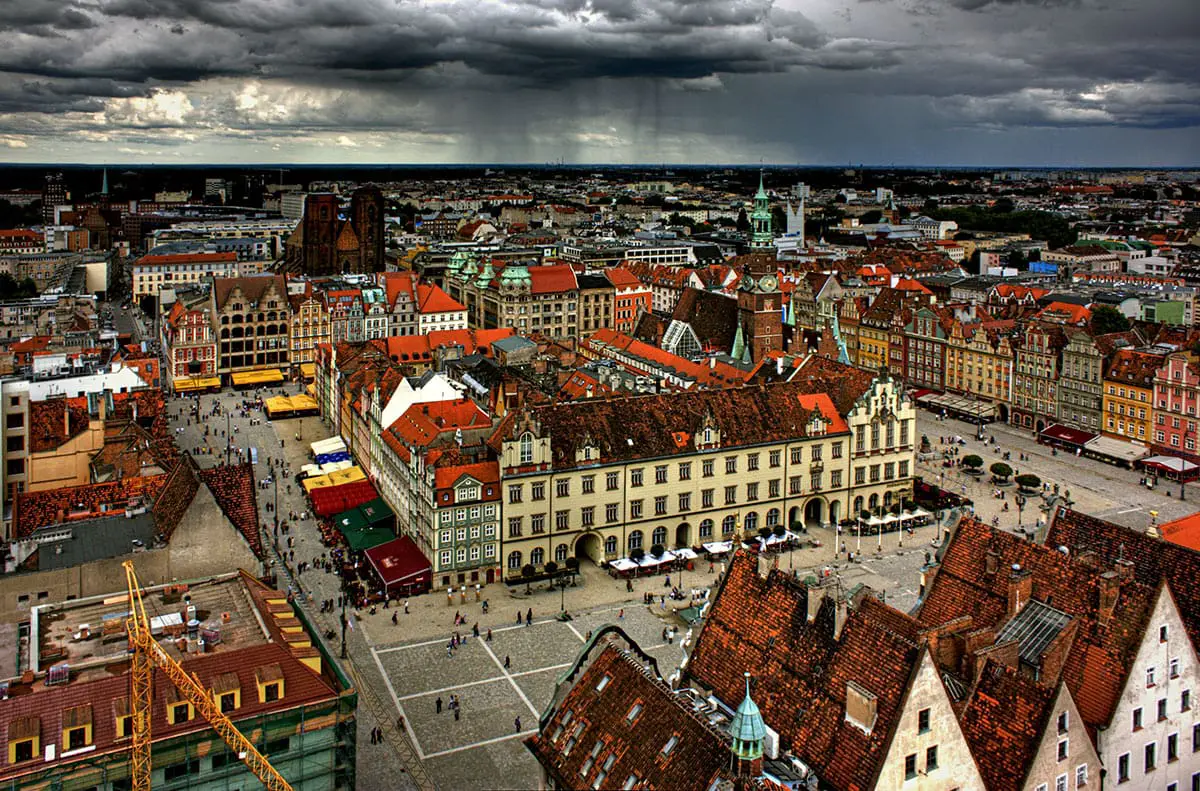
Wrocław Town Hall
Lower Silesia
Large, ornate Gothic building, built mainly in the late 13th – middle of the 16th century.
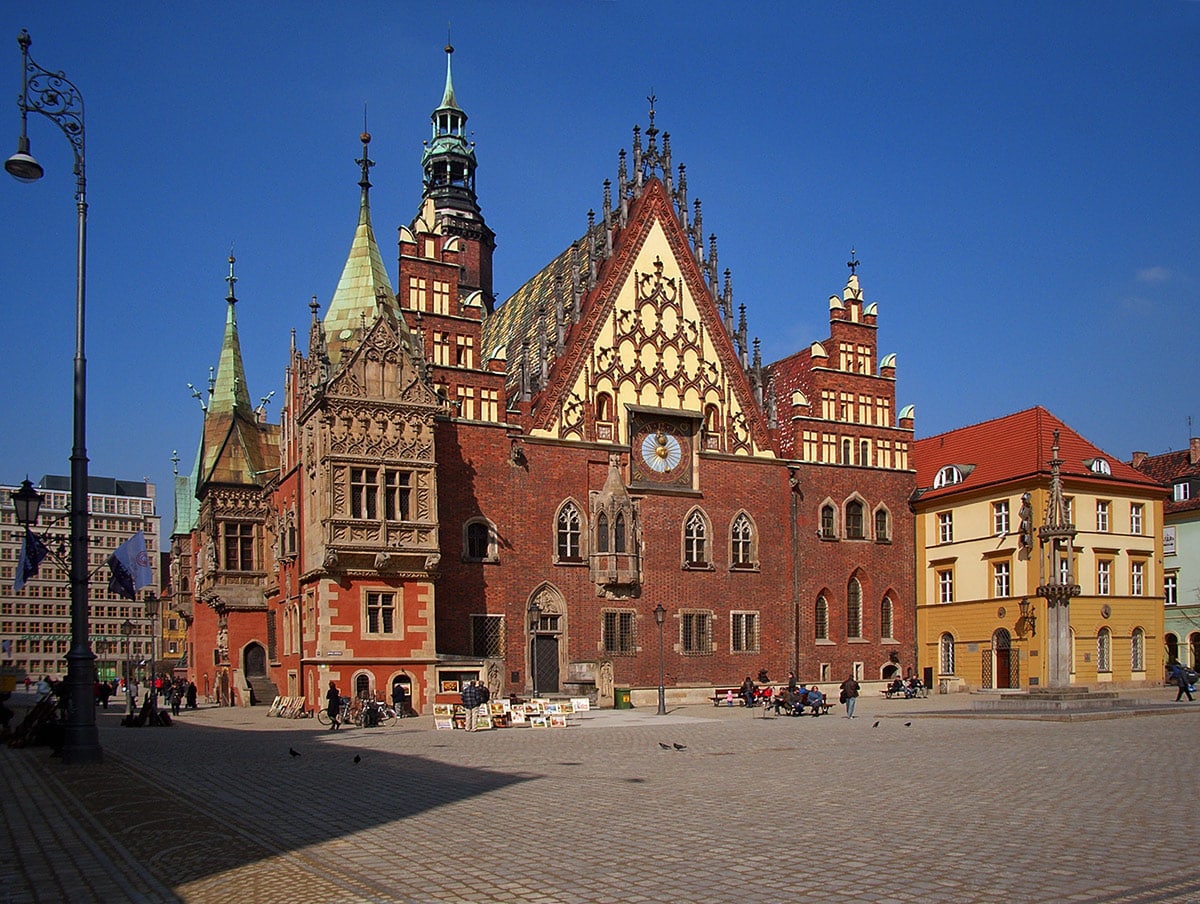
Chojnik Castle
Lower Silesia
Large fortress – castle on the top of a mountain. Built in the 13th – 14th century, partly in ruins.
 Recommended books
Recommended books
DK Eyewitness Travel Guide: Poland
DK Eyewitness Travel Guide: Poland is your in-depth guide to the very best of Poland. Whether exploring the liveliness of its big cities or taking in the natural beauty of its idyllic lakes, beaches, and mountains, you will experience the culture of Eastern hospitality and community values of this land that is deeply rooted in tradition and history.
Insight Guides Poland
Poland is a country in transformation, keen to drop its Communist past and become an integral part of a modern, innovative Europe. Be inspired to visit by the new edition of Insight Guide Poland, a comprehensive full-color guide comprehensively updated by a team of local Polish writers keen to showcase the beauty and new attractions that their country has to offer.

